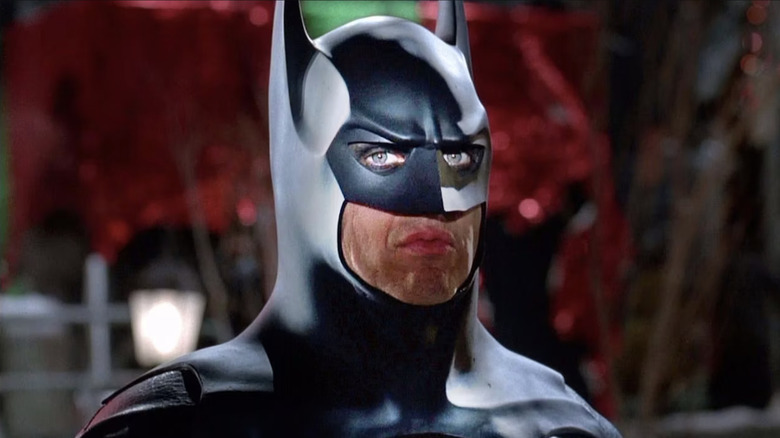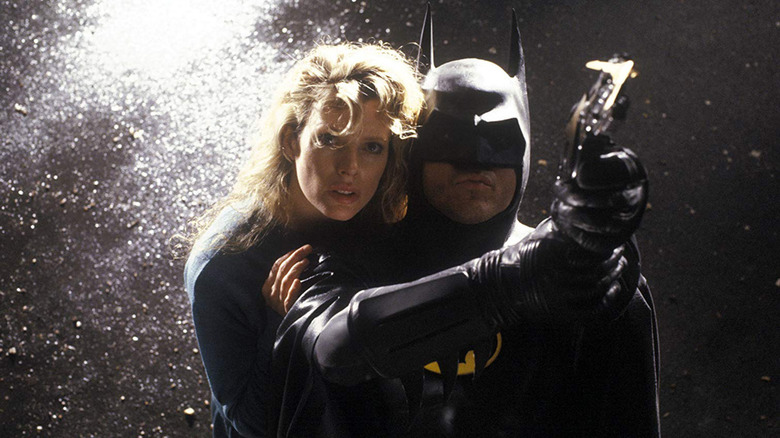Michael Keaton Knew Tim Burton's Batman Was A Massive Gamble
Looking back, it's somewhat astonishing that Tim Burton's 1989 film "Batman" was as big a hit as it was. Audiences were, of course, allured by the fact that 1989 offered the first time the character had graced a movie screen in 23 years and were likely intrigued by the fact that Batman was getting a massive budget and full-bore studio treatment. But the resulting film was odd in a way that wouldn't necessarily appeal to audiences today. Burton modeled the visuals of "Batman" after angular, shadow-filled German expressionist films like "The Cabinet of Dr. Caligari," and cribbed its tone from bleak, nihilistic film noir pictures. The message of film noir is that there are no more heroes and morality is dead, and Burton had the temerity to drop a superhero into the middle of it.
What's more, "Batman" was strikingly violent. Characters bled. One character was electrocuted into a charred skeleton. The Joker (Jack Nicholson) bore a permanent smile on his face thanks to exposure to poisonous chemicals and some awful reconstructive surgery. Compared to William Dozier's popular '66 TV series, this was a horror movie. The aesthetic gamble paid off, luckily, and "Batman" raked in hundreds of millions of dollars. To this day, "Batman" media is borrowing from Burton's aesthetic; Bruce Timm's "Batman: The Animated Series" in particular aped Burton's designs.
But while "Batman" was a hit, it wasn't considered a sure thing during its production. The casting of Michael Keaton as Batman left some people a little aghast, as Keaton was better known at the time for comedy films. Keaton himself admitted, in a recent interview with "60 Minutes," available to view on Paramount+, that "Batman" could very well have been a massive failure.
'I have a long memory'
Keaton remembers the controversy over his casting and understood the vitriol directed at him. In the "60 Minutes" interview, Keaton didn't want to name specifics, but he remembered the harsh words. In the politest possible terms, Keaton said: "You know, I have a long memory. So a couple of occasions where, you know, people were kinda ... maybe did more than doubt you. You go, 'Okay. I'll wait.'" Waiting, it seems for the doubters to see him. When pressed about what the specific instances were, Keaton merely said "Just things that happened a couple times. You just kinda clock it."
Interviewer Jon Wertheim began walking Keaton through his experiences being cast as Batman, and Keaton was quick to butt in with mock arrogance, stating that he was THE Batman, not just Batman. He quickly chuckled it off, however, happy to be humble again. He then remembered talking with Burton and the shared fear they both felt. Audiences were perhaps not as excited as Keaton would have liked. He said:
"[T]he first "Batman," I think Tim [Burton] and I both knew if that doesn't work, that one, I had awareness of ... I thought, 'Ooh, this — this could really fail.'"
He also added that there was a lot of pressure on him and on everyone to make sure "Batman" was a success. The reported budget was $35 million, a lot at the time, much of it going to Jack Nicholson's salary. Luckily for everyone, "Batman" made over $411 million worldwide, and became one of the biggest hits of its decade.
Indeed, it has remained so deeply entrenched in the pop consciousness that Keaton will be returning to the role in the upcoming film "The Flash," 31 years after his last appearance. That is a long memory indeed.

